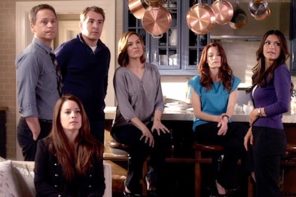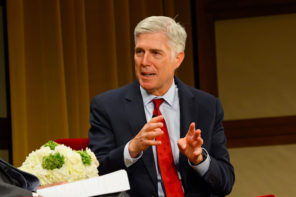Donald and Evelyn Knapp believe in “traditional Christian marriages,” though a lawsuit filed in federal court last week on their behalf calls into question whether that phrase holds any meaning beyond “not gay.”
Both Pentecostal ministers ordained in the Foursquare Gospel church, the Knapps run a for-profit wedding chapel called the Hitching Post in Coeur d’Alene, Idaho. Standing across from the Kootenai County courthouse, the Hitching Post has been facilitating weddings for 95 years and is, according to one local reporter, something of a Coeur d’Alene institution, “right up there with the famous Hudson’s Hamburgers.”
It is also now a front in the culture war over the meaning of marriage.
Last week, with the assistance of the Alliance Defending Freedom, the Knapps sued the city of Coeur d’Alene to keep it from enforcing an anti-discrimination ordinance, passed in 2013, prohibiting discrimination based on sexual orientation in housing, employment and “public accommodation.” It’s not clear that “public accommodation” applies to for-profit wedding chapels, but following a federal court ruling that overturned the state’s ban on same-sex marriages, Coeur d’Alene’s attorney said it might.
Religious institutions are exempt from the city’s anti-distrimination law. Individuals, however, even individuals who are ordained clergy, may not be. The city law speaks of places, not people. In other jurisdictions (such as nearby Washington State) where the question of who is required to preform same-sex marriages has come up, laws have specified that clergy don’t have to preside over any wedding they object to. The Idaho city’s ordinance was written in a different context, though; it didn’t originally apply to weddings since same-sex weddings weren’t yet legal in the state.
That context changed with a federal court ruling. Now, according to the Knapps and those rallying to the cause, the city is threatening to punish the Pentecostal ministers with mounting fines of up to $1,000 per day and imprisonment if they refuse to perform same-sex weddings.
The city hasn’t actually made any moves to enforce the ordinance, nor has it intimated that it will. The city’s attorney has suggested that refusing to marry gay couples at a for-profit wedding chapel would probably violate the law, but he’s been hesitant about it. The strongest statement he made was when he said he thought, “in theory,” that turning away a same-sex couple would be a violation, that “public accommodation” would likely legally include for-profit wedding chapels, if same-sex marriages were legal.
The Knapps are not waiting to see if that is true. The lawsuit is preemptive. The case is a legal test case, chosen to advance an argument about religious liberty and the religious rights of for-profit corporations.
This is an attempt to build on the Supreme Court’s ruling in the Hobby Lobby case and possibly further expand the scope of religious liberty. The lawsuit specifically appeals to the rights of “religious corporations,” and claims the Hitching Post is a religious corporation.
One doesn’t have to agree with the Knapps’ on same-sex marriage to think they have a plausible legal argument, as Eugene Volokh wrote in the Washington Post. One can also think there is a legitimate claim to the religious rights of a for-profit corporation that performs marriages and think, as First Things’ R.R. Reno does, that the fulminations about attacks on religious liberty are a bit overblown.
Aside from the legal and political questions, though, the case of the Knapps and the Hitching Post presents a good example of how the fight to defend marriage from “redefinition” can result in emptying the definition of most of its content. This is a fight about the meaning of marriage, after all. The Knapps themselves aren’t interested in the finer points of corporate law or First Amendment jurisprudence. They’re just committed to marriage. Specifically, the Knapps believe it’s their business to offer traditional Christian marriages for a fee.
Donald Knapp has consistently said this is his issue: “I cannot unite people in a way that I believe would conflict with what the Bible teaches.”
Which means what? What is a traditional Christian marriage, as offered by the Hitching Post?
According to the company’s website there are two wedding packages, each of which includes a minister, music, a venue for the wedding, use of a changing room, and legal documentation. The whole thing costs under $90. Six to 10 digital photos cost $12 extra. The Hitching Post offers three venues for the wedding: a chapel, mostly free of religious symbols but adorned with flowers and foliage; a “Western room,” with cowboy-boot-and-gun decor; and a “Victorian Sitting Room,” which also has flowers and foliage.
The ministers will also perform weddings at ski resorts and outdoor locations. They have performed weddings on boats, on horseback, on roller coasters, and in hot air balloons.
None of this seems specifically Christian or at all traditional, but there is a minister involved. The website notes that not all the ministers performing weddings are ordained by a church, but they do all have legal licenses in the state of Idaho.
Donald and Evelyn Knapp are ordained. They take their ordinations very seriously and understand that it comes with certain commitments. According to the lawsuit, “The Knapps and Hitching Post, LLC cannot perform [same-sex wedding] ceremonies because they believe God created marriage to be a sacred covenant between one man and one woman. The Knapps also pledged to follow this belief in their ordination vows.”
Their denomination, the Foursquare Gospel church, doesn’t actually specify that ministers cannot preside over same-sex weddings in the ordination vows. The denomination is opposed to same-sex marriage and what it calls the practice of homosexuality, though that isn’t mentioned in ordination. There was a move to add it as a requirement in 2012, more than 30 years after the Knapps were ordained, but the motion was tabled.
Homosexuality isn’t mentioned in the Foursquare bylaws and the Declaration of Faith makes no mention of family structures or appropriate legal arrangements of romantic partners. The handbook of church operations says the primary focus of ministers should be the salvation of souls, edification of the church, and the building up of the body of Christ through preaching, teaching, conducting services, and administering ordinances.” That might broadly be considered to include a commitment to not preforming same-sex marriages, but the church does not position it as a fundamental part of the ordination vow.
The creedal statement put together by the church’s founder, Aimee Semple McPherson, contains one specific line on marriage, that the church is opposed to divorce, except on “New Testament scriptural grounds.”
In the estimated 35,000 weddings that the Knapps have overseen, how many include people who have been divorced? It’s unclear. Nowhere in the legal proceedings or the public statements the Knapps have made has there been any mention of possible objections to second or third marriages. There are no records of couples being turned away because of their previous marriages, nor does the website warn that that’s a possibility.
The weddings at the Hitching Post might be considered Christian because there is a minister involved, but the ministers involved are not always ordained. The Knapps, who are ordained, would appear to be ignoring their church’s traditional creedal statement on marriage while insisting something not mentioned is a non-negotiable commitment.
The Christian-ness and traditional-ness of marriages at the Hitching Post, it would seem, is little more than the fact that the couple is opposite-sex. The phrase “traditional Christian marriage” is not entirely meaningless, but it doesn’t appear to mean much to the Knapps beyond “the couple is straight.”
According to the lawsuit, wedding services at the Hitching Post are traditional and Christian because they “include references to God, the invocation of God’s blessing on the union, brief remarks drawn from the Bible designed to encourage the couple and help them to have a successful marriage.”
The couples are also given several references for evangelical marriage advice guides, including works by Timothy Keller, Emmerson Eggerich, James Dobson, William Harley, and Gary Chapman, as well as a CD recording of two sermons on marriages. The wedding chapel is not rejecting people for ignoring those advice guides, though, or for asking for a ceremony free of Bible verses and prayers. It seems likely that if they did, some straight couples wouldn’t qualify for marriage at the Hitching Post.
At the same time, the 15 same-sex couples that have been turned away by the Knapps might have been fine with those things, but they still wouldn’t have had a wedding traditional enough or Christian enough for the Hitching Post.
In the fight to define marriage as between one man and one woman, the Hitching Post isn’t alone in arriving at a point where marriage has come to be defined as little more than that.





